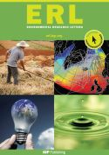
Environmental Research Letters
Scope & Guideline
Connecting research with real-world impact.
Introduction
Aims and Scopes
- Climate Change and Its Impacts:
Research exploring the effects of climate change on ecosystems, biodiversity, and human health, including studies on temperature extremes, precipitation changes, and the socio-economic consequences of climate variability. - Sustainable Resource Management:
Studies focused on the sustainable management of natural resources, including water, soil, and forests, with an emphasis on practices that enhance resilience to climate change while ensuring food security. - Pollution and Environmental Health:
Research addressing the sources, impacts, and mitigation strategies for various pollutants, including air and water quality, and their implications for public health and ecosystems. - Ecosystem Services and Biodiversity Conservation:
Investigations into the relationships between ecosystem services and biodiversity, emphasizing the importance of preserving ecosystems for human well-being and environmental sustainability. - Technological Innovations for Environmental Solutions:
Studies on the development and application of innovative technologies for environmental monitoring, pollution reduction, and climate change mitigation. - Socio-Ecological Systems and Governance:
Research examining the interplay between human systems and ecological processes, focusing on governance frameworks, policy analysis, and community engagement in environmental decision-making.
Trending and Emerging
- Climate Justice and Equity:
Research increasingly focuses on the social dimensions of climate change, including equity in climate action, the impacts on marginalized communities, and the role of social justice in environmental policy. - Nature-Based Solutions (NbS):
The use of nature-based solutions for addressing climate change and enhancing resilience has gained traction, emphasizing the role of ecosystems in mitigating environmental challenges. - Integrated Water-Energy-Food Nexus:
An increasing number of studies are exploring the interconnections between water, energy, and food systems, addressing how these sectors can be managed sustainably to enhance resilience and reduce environmental impacts. - Technological Innovations for Climate Mitigation:
There is a growing emphasis on research related to innovative technologies, such as carbon capture and storage, renewable energy solutions, and smart agriculture, which are seen as crucial for meeting climate targets. - Public Health and Climate Change Interactions:
The link between climate change and public health is a rapidly emerging area of research, focusing on how environmental changes affect health outcomes and the need for adaptive public health strategies.
Declining or Waning
- Traditional Ecological Studies:
There is a noticeable decline in studies focused solely on traditional ecological observations without integration into broader socio-economic contexts or climate change implications. - Localized Pollution Studies:
Research solely focused on localized pollution sources without considering broader regional or global implications has diminished, as the field shifts towards more integrative approaches. - Single-Dimensional Climate Models:
The reliance on simplistic climate models that do not account for the complexities of socio-ecological interactions is becoming less prevalent, reflecting a trend towards more comprehensive modeling approaches.
Similar Journals

Euro-Mediterranean Journal for Environmental Integration
Driving Change Through Interdisciplinary Environmental ResearchThe Euro-Mediterranean Journal for Environmental Integration, published by SPRINGER HEIDELBERG, serves as a pivotal platform for interdisciplinary research in the realm of environmental science, particularly focused on the unique ecological and socio-economic context of the Euro-Mediterranean region. With its ISSN 2365-6433 and E-ISSN 2365-7448, this journal aims to foster a collaborative approach to environmental challenges, integrating insights from various fields such as ecology, geography, and sustainable development. Since its inception in 2016, it has made significant strides, achieving a Q3 ranking in Environmental Science and maintaining a notable position within the Scopus rankings, sitting at #102 out of 233 in the general environmental science category, which reflects its growing influence in academic discourse. The journal is committed to open dialogue among researchers, professionals, and students aimed at advancing knowledge and promoting innovative solutions to pressing environmental issues. Access to its comprehensive articles and findings will be key to contributing to a more sustainable future.

One Earth
Fostering global conversations on sustainability and stewardship.One Earth is a premier academic journal published by Cell Press, dedicated to advancing research in the fields of Earth and Planetary Sciences as well as Environmental Science. With an impactful presence in the academic community and an impressive ranking, One Earth has achieved Q1 status in both Earth and Planetary Sciences and Environmental Science, showing its commitment to the highest standards of scholarly excellence. Founded in 2019, this journal has quickly established itself as a leading platform for groundbreaking research, contributing to the global conversation on sustainability and environmental stewardship. With a distinguished Scopus rank placing it in the 99th percentile among Earth and Planetary Sciences and the 97th percentile in General Environmental Science categories, One Earth aims to disseminate cutting-edge findings and foster innovative approaches to address pressing global challenges. The journal is indexed with an ISSN of 2590-3330 and an E-ISSN of 2590-3322, supporting a broad audience of researchers, professionals, and students passionate about ecological integrity and planetary health.

Environments is a distinguished international journal published by MDPI, focusing on the interdisciplinary realm of ecology, environmental sciences, and sustainability. Established in 2014, this Open Access journal allows unrestricted access to its high-quality research articles, making it an essential resource for researchers, professionals, and students alike. With its impact factor and Scopus ranks reflecting its academic significance—including a Q1 ranking in Ecology, Evolution, Behavior and Systematics—Environments serves as a critical platform for the dissemination of innovative research and practical applications in addressing pressing environmental challenges. The journal's commitment to promoting sustainability and renewable energy initiatives aligns with global efforts to foster a better understanding of our ecological systems and enhances its relevance in today’s rapidly evolving environmental landscape. The journal is based in Switzerland and encompasses a broad scope dedicated to advancing scholarly dialogue in environments related to ecological and environmental science.
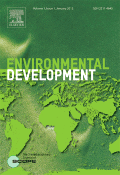
Environmental Development
Empowering scholars to influence impactful environmental strategies.Environmental Development is a premier academic journal published by Elsevier, dedicated to advancing the field of environmental science through interdisciplinary research and innovative practices. With a focus on geography, planning, and development, as well as management, monitoring, policy, and law, this journal provides a rigorous platform for scholars and practitioners to share insights that shape sustainable environmental policy and practice. Holding a prestigious Q1 ranking in both relevant categories and boasting impressive Scopus rankings - 62 out of 821 in Geography and 60 out of 399 in Environmental Science - Environmental Development stands out as a critical resource for those invested in the future of our planet. The journal emphasizes impactful research that addresses contemporary challenges, fostering dialogue across disciplines and geographical boundaries. With a commitment to high-quality research, it offers an important outlet for those aiming to influence environmental policy and developmental strategies globally. Join the growing community of researchers, professionals, and students engaged in promoting sustainable environmental practices through the knowledge shared in this esteemed publication.
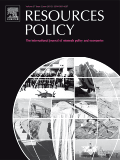
Resources Policy
Advancing Sustainable Solutions for a Resourceful FutureResources Policy, published by ELSEVIER SCI LTD, is a prestigious journal that has been at the forefront of advancing knowledge in the fields of Economics, Law, and Sociology since its inception in 1974. With an impressive Q1 ranking in multiple disciplines—including Economics and Econometrics, Law, Management, Monitoring, Policy and Law, and Sociology and Political Science—this journal showcases high-impact research and insights that are vital for academics, policymakers, and practitioners alike. With Scopus rankings placing it in the top percentiles of its respective categories, Resources Policy fosters interdisciplinary dialogue, promoting innovative solutions and policies concerning the sustainable management and use of resources. While currently not an open-access publication, the journal ensures that its rich content is accessible to those pursuing rigorous research and professional excellence. As we approach its 50th anniversary in 2024, Resources Policy continues to be an essential platform for critical discussions, evaluation, and advancements in resource management.

International Journal of Environmental Science and Technology
Bridging science and technology for a greener tomorrow.International Journal of Environmental Science and Technology, published by SPRINGER, stands as a premier platform for the dissemination of cutting-edge research in the fields of environmental science, technology, and engineering. With an impressive scope spanning from 2005 to 2024, this journal serves as a vital resource for academic and professional communities engaged in tackling pressing environmental challenges. It boasts a strong reputation, evidenced by its Q1 ranking in Agricultural and Biological Sciences and solid placements in Environmental Chemistry and Engineering. Researchers searching for high-impact studies will find the journal's contributions significant, as reflected in its rankings within Scopus: 34th percentile in Agricultural and Biological Sciences and notable standings in Environmental Engineering and Chemistry. Although the journal is not currently an Open Access resource, it maintains a commitment to academic rigor and innovation, making it indispensable for those devoted to advancing knowledge in environmental sustainability and technology.
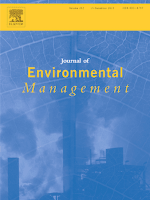
Journal of Environmental Management
Transforming research into impactful environmental policies.The Journal of Environmental Management is a leading peer-reviewed journal dedicated to advancing knowledge and research in the fields of environmental science, management, and policy. Published by Academic Press Ltd - Elsevier Science Ltd, this esteemed journal has been pivotal since its inception in 1973, providing a platform for innovative research, critical reviews, and insightful discussions surrounding pressing environmental issues. With an impressive impact factor placing it in the Q1 category across multiple disciplines—including Environmental Engineering and Waste Management—it ensures that published works are highly regarded and widely disseminated. Furthermore, its Scopus rankings reflect its prominence, being in the top percentile within its categories, which highlights the journal's influence on shaping environmental policies and practices. While the journal does not currently offer Open Access, it remains a crucial resource for researchers, professionals, and students committed to fostering sustainable management solutions. By continually addressing emerging challenges in environmental management, the journal serves as an essential reference point for academics and policymakers alike.
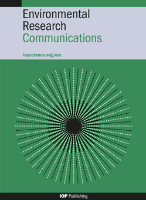
Environmental Research Communications
Bridging disciplines to tackle urgent environmental issues.Environmental Research Communications is a distinguished open-access journal published by IOP Publishing Ltd, focusing on cutting-edge research within the environmental sciences. With an ISSN of 2515-7620, this journal serves as a vital platform for the dissemination of pivotal studies that address urgent environmental issues. Since its inception in 2019, Environmental Research Communications has positioned itself as a reputable source of knowledge, achieving a Q1 ranking in various categories, including Agricultural and Biological Sciences and Earth-Surface Processes, indicating its significant impact in these fields. The journal boasts impressive Scopus ranks, ensuring visibility and recognition among global scholars. With open access options, it encourages a broader readership and fosters collaboration across disciplines, making it an essential resource for researchers, professionals, and students dedicated to advancing the understanding and preservation of our environment.

Resources Environment and Sustainability
Shaping Policies and Practices for a Sustainable FutureResources Environment and Sustainability is a premier academic journal published by ELSEVIER, dedicated to advancing knowledge in the fields of environmental science, engineering, and sustainability practices. Recognized for its rigorous peer-review and high-quality research, the journal boasts an impressive impact factor and consistently ranks in the first quartile across multiple categories, including Environmental Engineering, Environmental Science, Management, Monitoring, Policy and Law, and Pollution. With its Scopus rankings placing it among the top journals—#7 in Environmental Science and #12 in Environmental Engineering—this journal provides a vital platform for researchers, professionals, and students seeking to contribute to evolving policies, innovative management strategies, and cutting-edge environmental solutions. Hosted in the Netherlands, Resources Environment and Sustainability is committed to fostering interdisciplinary dialogue and disseminating high-impact research that addresses the pressing challenges of our times. This journal embraces open access principles, ensuring that the wealth of knowledge it publishes remains accessible to a global audience.
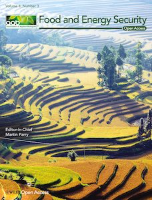
Food and Energy Security
Empowering Research for Food Security and Energy ResilienceFood and Energy Security, an esteemed journal published by WILEY, is dedicated to advancing the fields of food science, agriculture, and renewable energy. Since its inception in 2012, this open-access journal has provided a platform for groundbreaking research and innovative practices that address global challenges related to food production and energy sustainability. With an impressive impact factor reflected in its Q1 quartile rankings across notable categories such as Agronomy and Crop Science and Food Science, this journal is instrumental for researchers and practitioners alike who are focused on enhancing food security and promoting sustainable energy solutions. The journal's scope encompasses multidisciplinary approaches and encourages submissions that explore the intersection of food systems and energy dynamics, ensuring relevance in the evolving landscape of environmental science and policy. By offering open access to its publications, Food and Energy Security commits to making vital research accessible, fostering informed dialogue and collaboration among scholars, policymakers, and the agrifood industry worldwide.